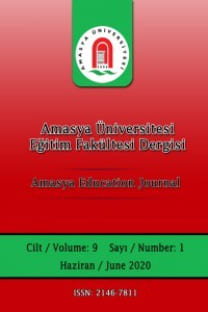İnternet Temelli Öğrenimde Metaforlar ve Modeller
Öz
Özet İnternet temelli eğitim ve öğretime ilişkin çoğu site, sanal bir sınıfın metaforunu ve sanal bir dersin modelini sunan bir yöntembilimi kullanmaktadır. Bu makale, tartışmalar, alan çalışmaları, seminerler ve söylenti grupları gibi diğer öğretim tekniklerinin, daha etkileşimli ve ilginç bir öğrenme deneyimi oluşturmak için internette sanal bir sınıf ortamında verilebilen yöntemlerini araştırmaktadır. Gizil hedefler, kendi web sitelerini tasarlayanları, tartışmaları ve bir öğrenci geçit töreni düzenleyenlerle öğrenci katılımını içermektedir. Bu makale, web temelli ortamda gerçekleştirilen 4 yıllık öğretim süreci boyunca “öğrenilen dersleri” bir listeyle tamamlamaktadır.
Anahtar Kelimeler:
Yetişkin Öğrenimi, Uzaktan Eğitim ve Tele Öğrenme, Bilgisayar Aracılığıyla İletişim, Birlikte/İşbirlikçi Öğrenme, İnsan-Bilgisayar Arayüzü
___
- Aristotle (s.a.) Poetics trans. S.H. Butcher. The internet classics archive. [On-line]. Available: http://classics.mit.edu//Aristotle/poetics.html Anderson, T., & Kanuka, H. (1997). On-line forums: new platforms for Professional development and group collaboration. Journal of Computer-Mediated Communication, [On-line], 3(3). Available: http://jcmc.huji.ac.il/vol3/issue3/anderson.html
- Baym, N. (1995). The performance of humor in computermediated communication. Journal of Computer-Mediated Communication. [On-line], 1 (2). Available: http://jcmc.huji.ac.il/vol1/issue2/baym.html
- Bonnycastle, D. (1997) If only I could dance this—semiotics and instructional design. [On-line], Available: http:// www.usask.ca/education/coursework/802papers/Bonnycas tle/Bonnycastle.HTM
- Branscomb, A. W. (1996). Cyberspaces: familiar territory or lawless frontiers. Journal of Computer MediatedCommunication [On-line], 2(1). Available: http://jcmc.huji.ac.il/vol2/issue1/introl.html
- Clarke, R. E. (1994). Media will never influence learning. Educational Technology Research and Development, 42(2), 21–30.
- Cunningham, D. (1992). A brief history of semiotics. [On-line]. Available:http://www.coe.usouthal.edu/semed/brehist.html Garton, L., Haythornthwaite, C., & Wellman, B. (1997). Studying online social networks. Journal of Computer Mediated-Communication [On-line], 3(1). Available: http://jcmc.huji.ac.il/vol3/issue1/garton.html
- Jih, H. J., & Reeves, T. C. (1992). Mental models: a research focus fir interactive learning systems. Educational Technology Research and Development, 40(3), 39–53.
- Johnson, D. W., & Johnson, R. T. (1991). Learning together and alone. New Jersey: Prentice Hall
- Jones, Q. (1997). Virtual-communities, virtual settlements & cyber-archaeology: A theoretical outline. Journal of Computer-Mediated Communication [On-line], 3(3). Available: http://jcmc.huji.ac.il/vol3/issue3/jones.html
- Kies, D. (1998) Implementing online pedagogy. Availble at: http://www.cod.edu/dept/KiesDan/UWS/
- Kozar, S. (1995). Enduring traditions, ethereal transmissions: recreating Chinese New Year celebrations on the Internet. Journal of ComputerMediated Communication [On-line], 1(2). Available at: http://jcmc.huji.ac.il/vol1/issue2/kozar.html
- Kozma, R. B. (1994). Will media influence learning? reframing the debate. Educational Technology Research and Development, 42(2), 7–20.
- Mabry, E. (1997). Framing flames: The structure of argumentative messages on the net. Journal of ComputerMediated Communication [On-line], 2(4). Available: http://jcmc.huji.ac.il/vol2/issue4/mabry.html
- Marvin, L. E. (1995). Spoof, spam, lurk and lag: the aesthetics of text-based virtual realities. Journal of ComputerMediated Communication [On-line], 1(2). Available: http://jcmc.huji.ac.il/vol1/issue2/marvin.html
- Pacagnella, L. (1997). Getting the seat of your pants dirty: strategies for ethnographic research on virtual communities. Journal of Computer MediatedCommunication [On-line], 3(1). Available: http://jcmc.huji.ac.il/vol3/issue1/paccagnella.html
- Rieber, L. P. & Noah, D. (1997) Effect of gaming and visual metaphors on reflective cognition within computer-based simulations. Available: http://itech1.coe.uga.edu/faculty/lprieber/aera1997/aera19 9html
- Russell, T. R. (s.a.) The no significant difference phenomenon. Available: http://cuda.teleeducation.nb.ca/nosignificantdifference/ Van Brakel, P. A. (1996) Implementing study guides via Internet’s World-Wide Web. Proceedings of Conference on Information Technology in Tertiary Education.
- ISSN: 2146-7811
- Yayın Aralığı: Yılda 2 Sayı
- Başlangıç: 2012
- Yayıncı: Amasya Üniversitesi
Sayıdaki Diğer Makaleler
Hava İPEK AKBULUT, Salih ÇEPNİ
Bilgisayar Oyunlarının Öğrenci Güdülenmesine Etkisi
Akademisyenlik Bağlamında Bilimsel Üretkenliği Etkileyen Çevresel Faktörler
Fadime MENGİ, Sinan SCHREGLMANN
AGSL Ud Eğitimine Yönelik Kadın Ud Eğitimcilerinin Görüşlerinin İncelenmesi
Engelliler Konusunda Verilen Eğitim Programının Engellilere Yönelik Tutumlar Üzerindeki Etkisi
Feyzullah ŞAHİN, Birkan GÜLDENOĞLU
Fatma TOPUZ, Sevgi GENÇER, Ahmet BACANAK, Orhan KARAMUSTAFAOĞLU
Sınıf Öğretmenlerinin Fen Öğretimi Öz-Yeterlik İnançlarının İncelenmesi: Rize İli Örneklemi
